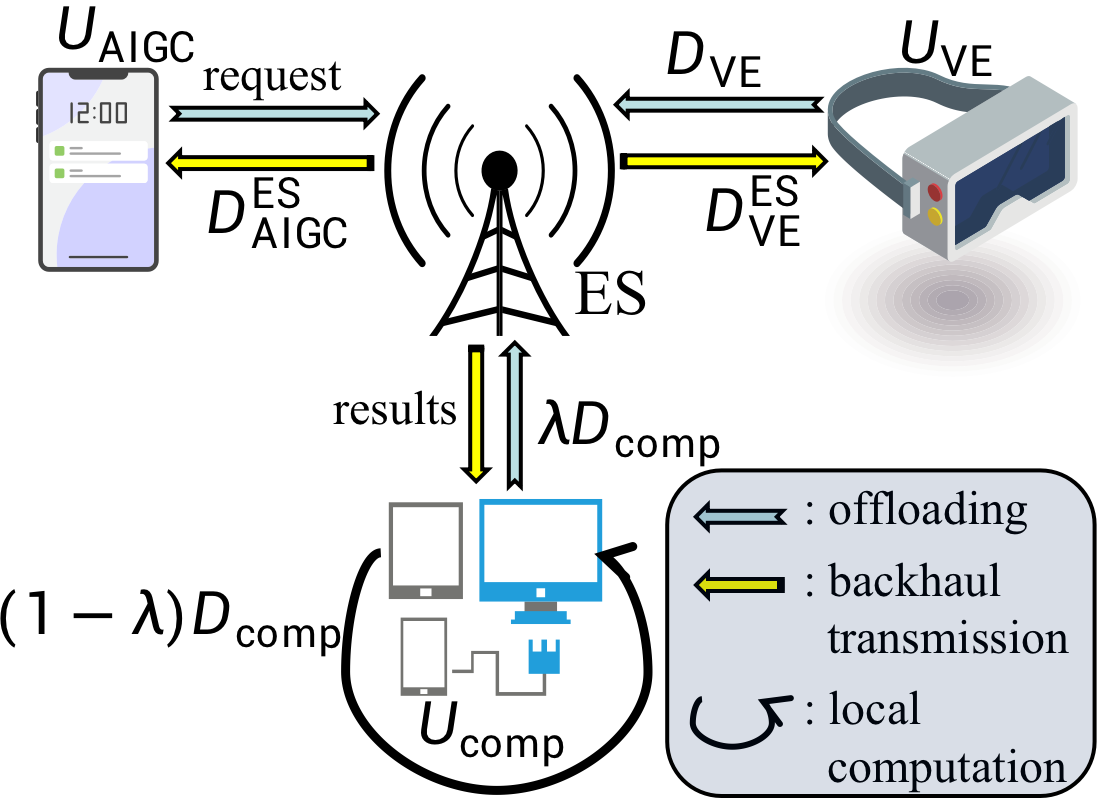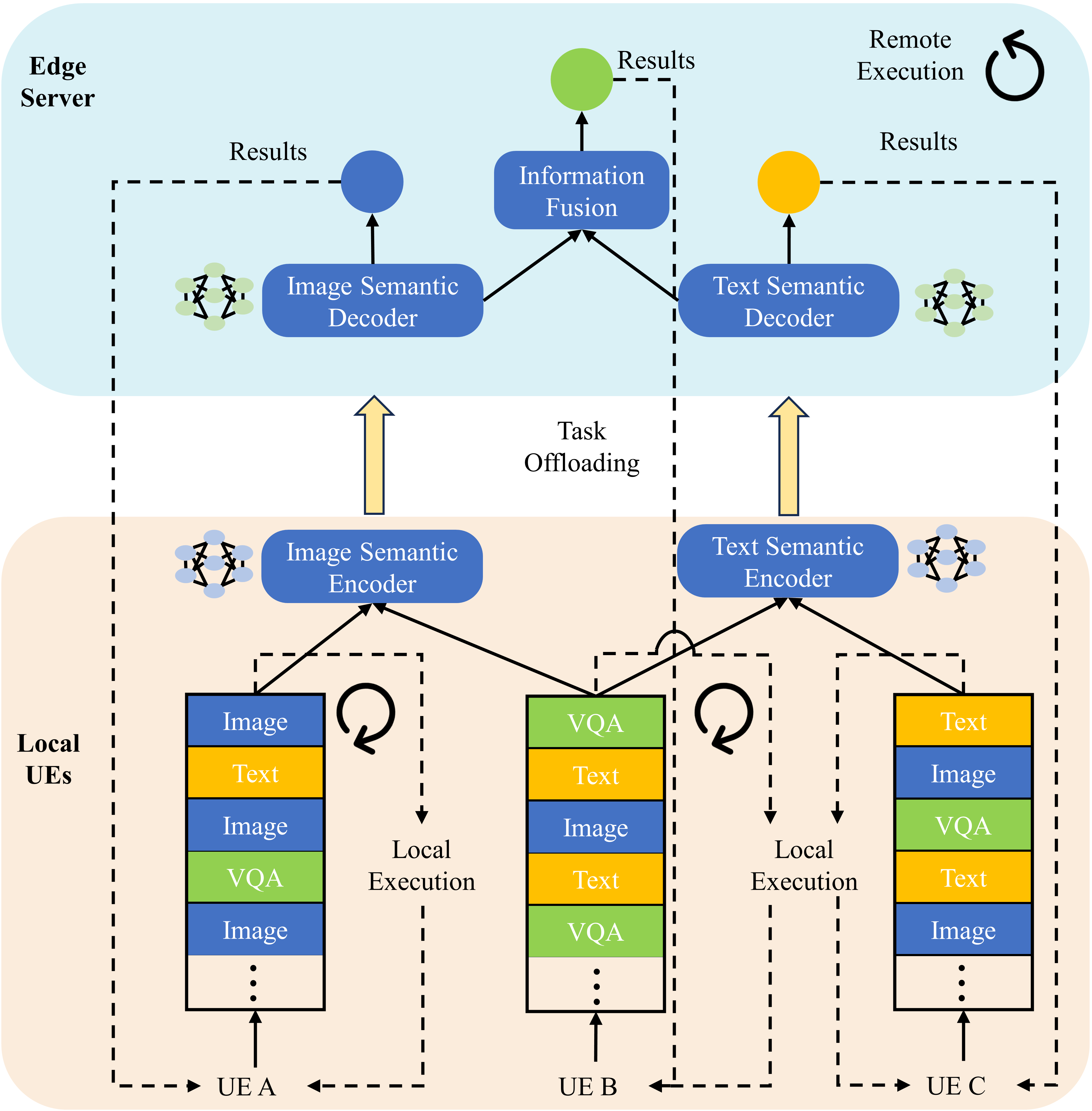Accelerating Mobile Edge Generation (MEG) by Constrained Learning

0

Sign in to get full access
Overview
- This paper explores an approach called "Accelerating Mobile Edge Generation (MEG) by Constrained Learning" to improve the performance of generative AI models running on edge devices.
- The key ideas include using reinforcement learning to optimize the training process and constrain the model's output to meet specific requirements, such as energy efficiency or inference latency.
- The research aims to address challenges in deploying resource-intensive generative AI models on mobile and edge devices with limited computational power and battery life.
Plain English Explanation
Generative AI models, such as those used for text generation or image synthesis, can be very powerful, but they also require a lot of computing power. This can be a problem when you want to run these models on mobile devices or at the "edge" of a network, where devices have less processing power and battery life.
The researchers in this paper propose a new approach called "Constrained Learning" to help address this issue. The key idea is to use a technique called reinforcement learning to train the AI model in a way that optimizes its performance on the target device. For example, the model might be trained to prioritize energy efficiency or low latency, rather than just maximizing the quality of its outputs.
By incorporating these constraints into the training process, the researchers hope to create generative AI models that can run more effectively on mobile and edge devices, without sacrificing too much in terms of the quality of the generated content. This could enable a wider range of applications for generative AI, like on-device image generation or optimized communication schemes for mobile devices.
Technical Explanation
The researchers propose a framework called "Accelerating Mobile Edge Generation (MEG) by Constrained Learning" to address the challenges of deploying resource-intensive generative AI models on mobile and edge devices. The key elements of their approach include:
-
Reinforcement Learning (RL) for Model Optimization: The researchers use RL to train the generative AI model, with the goal of optimizing its performance on the target device. This involves defining suitable reward functions that capture the desired constraints, such as energy efficiency or inference latency.
-
Constrained Generative Model: The researchers modify the architecture of the generative model to incorporate the RL-based constraints directly into the model's output. This helps ensure that the generated content meets the specified requirements without the need for costly post-processing.
-
Iterative Training and Evaluation: The researchers propose an iterative training and evaluation process, where the model is trained on the RL-based objective, then tested on the target device. The results of this evaluation are used to further refine the model and the RL reward function.
Through experiments on various generative AI tasks, the researchers demonstrate that their "Constrained Learning" approach can significantly improve the performance of the models on mobile and edge devices, in terms of metrics like energy consumption and inference latency, while maintaining reasonable output quality.
Critical Analysis
The researchers have presented a compelling approach to address the challenges of deploying resource-intensive generative AI models on mobile and edge devices. The use of reinforcement learning to optimize the model's performance under specific constraints, such as energy efficiency and latency, is a promising direction.
One potential limitation of the research is the reliance on simulated device performance metrics, rather than real-world measurements. While the simulations may provide useful insights, it would be valuable to validate the findings on actual mobile and edge hardware to understand the practical implications and any potential discrepancies between the simulated and real-world results.
Additionally, the paper does not explore the broader implications of this approach, such as how it might impact the design and development of generative AI applications for mobile and edge computing. Further research could investigate the trade-offs between model performance, output quality, and other factors that may influence the adoption and deployment of these techniques in real-world scenarios.
Conclusion
This research proposes a novel approach called "Accelerating Mobile Edge Generation (MEG) by Constrained Learning" to improve the performance of generative AI models on mobile and edge devices. By incorporating reinforcement learning-based constraints into the model training process, the researchers aim to create more efficient and effective generative AI models that can be deployed on resource-constrained platforms.
The findings suggest that this approach holds promise for enabling a wider range of generative AI applications on mobile and edge devices, such as on-device image generation, optimized communication schemes, and other use cases where both output quality and resource efficiency are crucial. Further exploration of the practical implications and broader applications of this technique could help advance the field of edge AI and generative AI deployment.
This summary was produced with help from an AI and may contain inaccuracies - check out the links to read the original source documents!
Related Papers


0
Accelerating Mobile Edge Generation (MEG) by Constrained Learning
Xiaoxia Xu, Yuanwei Liu, Xidong Mu, Hong Xing, Arumugam Nallanathan
A novel accelerated mobile edge generation (MEG) framework is proposed for generating high-resolution images on mobile devices. Exploiting a large-scale latent diffusion model (LDM) distributed across edge server (ES) and user equipment (UE), cost-efficient artificial intelligence generated content (AIGC) is achieved by transmitting low-dimensional features between ES and UE. To reduce overheads of both distributed computations and transmissions, a dynamic diffusion and feature merging scheme is conceived. By jointly optimizing the denoising steps and feature merging ratio, the image generation quality is maximized subject to latency and energy consumption constraints. To address this problem and tailor LDM sub-models, a low-complexity MEG acceleration protocol is developed. Particularly, a backbone meta-architecture is trained via offline distillation. Then, dynamic diffusion and feature merging are determined in online channel environment, which can be viewed as a constrained Markov Decision Process (MDP). A constrained variational policy optimization (CVPO) based MEG algorithm is further proposed for constraint-guaranteed learning, namely MEG-CVPO. Numerical results verify that: 1) The proposed framework can generate 1024$times$1024 high-quality images over noisy channels while reducing over $40%$ latency compared to conventional generation schemes. 2) The developed MEG-CVPO effectively mitigates constraint violations, thus flexibly controlling the trade-off between image distortion and generation costs.
Read more8/9/2024


0
Latency-Aware Resource Allocation for Mobile Edge Generation and Computing via Deep Reinforcement Learning
Yinyu Wu, Xuhui Zhang, Jinke Ren, Huijun Xing, Yanyan Shen, Shuguang Cui
Recently, the integration of mobile edge computing (MEC) and generative artificial intelligence (GAI) technology has given rise to a new area called mobile edge generation and computing (MEGC), which offers mobile users heterogeneous services such as task computing and content generation. In this letter, we investigate the joint communication, computation, and the AIGC resource allocation problem in an MEGC system. A latency minimization problem is first formulated to enhance the quality of service for mobile users. Due to the strong coupling of the optimization variables, we propose a new deep reinforcement learning-based algorithm to solve it efficiently. Numerical results demonstrate that the proposed algorithm can achieve lower latency than two baseline algorithms.
Read more8/6/2024


0
MobileMEF: Fast and Efficient Method for Multi-Exposure Fusion
Lucas Nedel Kirsten, Zhicheng Fu, Nikhil Ambha Madhusudhana
Recent advances in camera design and imaging technology have enabled the capture of high-quality images using smartphones. However, due to the limited dynamic range of digital cameras, the quality of photographs captured in environments with highly imbalanced lighting often results in poor-quality images. To address this issue, most devices capture multi-exposure frames and then use some multi-exposure fusion method to merge those frames into a final fused image. Nevertheless, most traditional and current deep learning approaches are unsuitable for real-time applications on mobile devices due to their heavy computational and memory requirements. We propose a new method for multi-exposure fusion based on an encoder-decoder deep learning architecture with efficient building blocks tailored for mobile devices. This efficient design makes our model capable of processing 4K resolution images in less than 2 seconds on mid-range smartphones. Our method outperforms state-of-the-art techniques regarding full-reference quality measures and computational efficiency (runtime and memory usage), making it ideal for real-time applications on hardware-constrained devices. Our code is available at: https://github.com/LucasKirsten/MobileMEF.
Read more8/16/2024


0
Online Multi-Task Offloading for Semantic-Aware Edge Computing Systems
Xuyang Chen, Qu Luo, Gaojie Chen, Daquan Feng, Yao Sun
Mobile edge computing (MEC) provides low-latency offloading solutions for computationally intensive tasks, effectively improving the computing efficiency and battery life of mobile devices. However, for data-intensive tasks or scenarios with limited uplink bandwidth, network congestion might occur due to massive simultaneous offloading nodes, increasing transmission latency and affecting task performance. In this paper, we propose a semantic-aware multi-modal task offloading framework to address the challenges posed by limited uplink bandwidth. By introducing a semantic extraction factor, we balance the relationship among transmission latency, computation energy consumption, and task performance. To measure the offloading performance of multi-modal tasks, we design a unified and fair quality of experience (QoE) metric that includes execution latency, energy consumption, and task performance. Lastly, we formulate the optimization problem as a Markov decision process (MDP) and exploit the multi-agent proximal policy optimization (MAPPO) reinforcement learning algorithm to jointly optimize the semantic extraction factor, communication resources, and computing resources to maximize overall QoE. Experimental results show that the proposed method achieves a reduction in execution latency and energy consumption of 18.1% and 12.9%, respectively compared with the semantic-unaware approach. Moreover, the proposed approach can be easily extended to models with different user preferences.
Read more7/17/2024